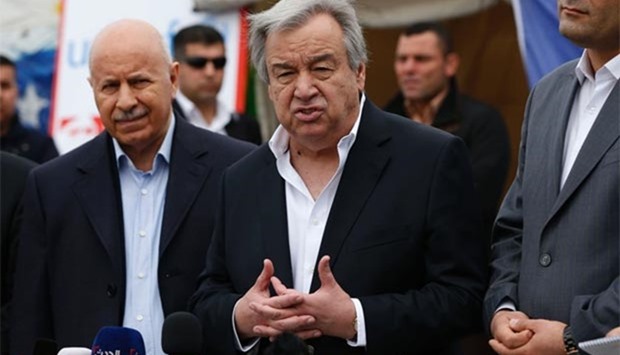UN chief Antonio Guterres appealed on Friday for more aid for the people of Mosul, as he visited a camp for Iraqis displaced by the battle to retake the second city from jihadists.
Iraq is nearly six months into the operation to oust the Islamic State group from its most populous bastion -- a battle that has sparked major humanitarian concerns.More than 200,000 civilians have fled IS-held west Mosul since last month, while the fighting has taken a devastating toll among the hundreds of thousands more still trapped in the battleground.
"We don't have the resources that are necessary to support these people and we don't have the international solidarity that is needed," Guterres told journalists during a visit to the Hasan Sham Camp.
"Unfortunately, our programme here is only funded at eight percent. That shows how limited our resources are," he said.
"These people have suffered enormously, and they go on suffering. We need more solidarity from the international community."
Guterres said there were not enough resources available to provide acceptable living conditions for the people of Mosul or for the reconciliation efforts that will need to follow when the city has been fully recaptured.
Whether or not real reconciliation occurs in Mosul and elsewhere will play a major role in determining whether Iraq moves towards stability or further violence.
Guterres is on the second day of a visit to Iraq, after meeting top officials, including Prime Minister Haider al-Abadi, on Thursday.
As he began his visit in Baghdad, Guterres called for the protection of civilians to be the "absolute priority," after the battle for Mosul resulted in numerous civilian deaths and widespread privation.
The UN said earlier this month that some 600,000 civilians were still in west Mosul, 400,000 of them trapped in siege-like conditions in the Old City.
Remaining in the city has posed deadly danger to residents, with the UN human rights office saying more than 300 civilians were killed in west Mosul in little over a month.
Gunfire, shelling, bombs and air strikes have all taken their toll.
The Iraqi government has sought to blame the jihadists for the deaths.
Spokesman Colonel Joe Scrocca too accused IS of attempting to bait the US-led coalition supporting the operation into carrying out strikes that would kill civilians in order "to take advantage of the public outcry and the terror."
Scrocca said the number of jihadists remaining in Mosul had fallen significantly since Iraqi forces launched the operation to retake the west of the city last month, down from an estimated 2,000 to less than half that now.
Iraqi authorities say more than 200,000 civilians have fled the fighting since mid-February.
Camps have been set up around the city to provide shelter for the displaced, while others are staying with relatives, renting accommodation or residing in makeshift shelters or unfinished buildings.
IS overran large areas north and west of Baghdad in 2014, but Iraqi forces backed by US-led air strikes have since regained much of the territory they lost.
Iraqi forces launched the operation to retake Mosul in October, retaking its east side in January before setting their sites on the smaller but more densely populated west.
The fighting has inflicted heavy casualties on the Iraqi security forces, according to the head of US Central Command, General Joseph Votel.
Votel told a congressional committee that 490 Iraqi security personnel were killed and more than 3,000 wounded in the battle for east Mosul, while 284 have been killed and more than 1,600 wounded in fighting for the west.

